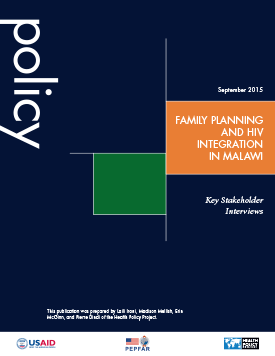The Health Policy Project ended in 2016. Work continued under Health Policy Plus (HP+) until 2022.
PUBLICATION
Author(s): Laili Irani, Madison Mellish, Erin McGinn, and Pierre Dindi
Primary Language: English
Date: 9/15/2015
Abstract:
In order to better understand how FP-HIV integration is being implemented, HPP conducted a situational analysis of the policy and program environment by speaking to 48 national- and district-level stakeholders. The purpose of the interviews was to understand stakeholders’ perspectives on how integration of FP and HIV services as mentioned in the policies was being implemented and how integration of services could further be improved. The semistructured interviews covered various topics including institutional arrangements; processes for addressing integration within health systems such as human resources, commodities, infrastructure, and monitoring and reporting; financing mechanisms; integration within health facilities; the role of the private sector; and behavior change communication (BCC).
Our findings cover stakeholder perspectives on the institutional arrangements at the national and district levels through which health services and programs are being implemented within the public sector. We further assessed opinions on the progress made in integrating FP and HIV services across the components of the health systems, such as trained healthcare workers, availability of commodities, facility structures to ensure integration, and joint monitoring and reporting. Stakeholders also described how FP and HIV services are currently being implemented in the majority of the facilities and shared some successful pilot programs of integration. This report also describes how information on FP and HIV is currently being addressed in BCC and mass media campaigns, highlights the role of the private sector in assisting to provide FP and HIV services, and also pays special attention to the progress made in reaching youth.
Family Planning/Reproductive Health (FP/RH) HIV Integration Report Malawi


